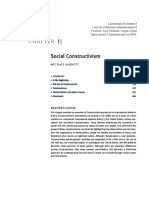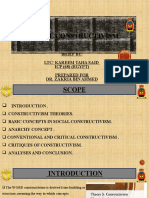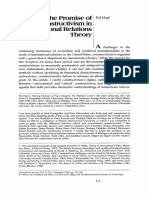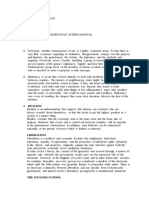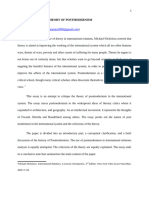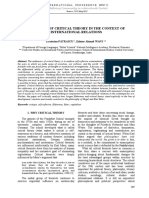Constructivist
Constructivist
Uploaded by
iheartyoulianneCopyright:
Available Formats
Constructivist
Constructivist
Uploaded by
iheartyoulianneOriginal Description:
Copyright
Available Formats
Share this document
Did you find this document useful?
Is this content inappropriate?
Copyright:
Available Formats
Constructivist
Constructivist
Uploaded by
iheartyoulianneCopyright:
Available Formats
CONSTRUCTIVIST
DEFINITION
THEORY
DEVELOPMENT
INTERNATIONAL RELATION
SOCIAL THEORY
CONTENT
DEFINITION
CONSTRUCTIVISM
is the claim that significant aspects of
international relations are historically and
socially contingent, rather than inevitable
consequences of human nature or other
essential characteristics of world politics.
THEORY
focus on human awareness or
consciousness and its place in world
affairs.
it focuses on how the
distribution of material power
defines balances of power
between states and explains
the behavior of states
the most important aspect of
international relations is social, not
material.
DEVELOPMENT
Nicholas Onuf
Alexander Wendt
1980s and early 1990s,
constructivism has become one of the
major schools of thought within
international relations.
RECENT DEVELOPMENT
A significant group of scholars who study
processes of social construction self-
consciously eschew the label "Constructivist.
They argue that "mainstream"
constructivism has abandoned many of the
most important insights from linguistic
turn and social-constructionist theory in the
pursuit of respectability as a "scientific"
approach to international relations.
INTERNATIONAL RELATION
constructivism as a social theory
operates at a high level of abstraction: it
tells something about international
relations, but it is not concerned with IR
specifically.
One of the most well
known IR
constructivists is
Alexander Wendt
Wendt challenged the neorealist
position by asserting , anarchy is what
states make of it.
What do you think he
means?
Anarchy is a social construction. It is not
inherently dangerous, unstable, or scary;
instead, it becomes so only when states
interpret it as such, however, it is not just
interpretation that matters, but also
interaction with others that create and
instantiate one structure of identities and
interests rather than another; structure has no
existence or causal power apart from
process
SOCIAL THEORY
What does it mean to say that
constructivism is a social theory?
Social theory is more general theory
about the social world (at large), about
social action and about the relationship
between structures and actors
Constructivism as social theory rests on an
ideational view
The core ideational element upon which
constructivists focus is intersubjective beliefs (and
ideas, conceptions and assumptions) that are widely
shared among people. Ideas must be widely shared to
matter; nonetheless they can be held by different
groups, such as organizations, policymakers, social
groups or society).
You might also like
- PM Writing Exemplar Big Book 1Document12 pagesPM Writing Exemplar Big Book 1ImranuNo ratings yet
- Toefl Question TypesDocument8 pagesToefl Question TypesSix minutesNo ratings yet
- Barnett, M. (2005) - Social Constructivism PDFDocument20 pagesBarnett, M. (2005) - Social Constructivism PDFJesús Medina100% (1)
- Airlift - Rider Supply Associate - Case StudyDocument2 pagesAirlift - Rider Supply Associate - Case StudyS Ahmed50% (2)
- University of The Philippines Bachelor of Science in Biology Marc Timothy C. TanDocument9 pagesUniversity of The Philippines Bachelor of Science in Biology Marc Timothy C. TanRhea CelzoNo ratings yet
- Constructivism and International RelationsDocument16 pagesConstructivism and International Relationsmarievalenc0% (1)
- Constructivism: Presented By: Binita Subedi Roll No: 27 Section: ADocument9 pagesConstructivism: Presented By: Binita Subedi Roll No: 27 Section: ABinita SubediNo ratings yet
- Constructivism: Presented By: Binita Subedi Roll No: 27 Section: ADocument9 pagesConstructivism: Presented By: Binita Subedi Roll No: 27 Section: ABinita SubediNo ratings yet
- Constructivism (International Relations) - WikipediaDocument18 pagesConstructivism (International Relations) - WikipediaSaad SbNo ratings yet
- Constructivism (International Relations)Document8 pagesConstructivism (International Relations)ReubenPhilipNo ratings yet
- PostmodernisnDocument6 pagesPostmodernisnMohammad NaqaviNo ratings yet
- Topic 5 A ConstructivismDocument5 pagesTopic 5 A ConstructivismTayyab NaqviNo ratings yet
- Constructivism PDFDocument24 pagesConstructivism PDFdsjekw kjekwjeNo ratings yet
- Constructivism: Theories of International RelationsDocument24 pagesConstructivism: Theories of International Relationsdsjekw kjekwjeNo ratings yet
- Social ConstructivisimDocument19 pagesSocial ConstructivisimAhmad AzrulNo ratings yet
- Jackson - Sorensen - Social Constructivism - 2 PDFDocument17 pagesJackson - Sorensen - Social Constructivism - 2 PDFEugenia Bautista CruzNo ratings yet
- Definition of Constructivism TheoryDocument2 pagesDefinition of Constructivism TheoryFikriNo ratings yet
- Social Constructivism andDocument8 pagesSocial Constructivism and295Sangita PradhanNo ratings yet
- Momna SheikhDocument24 pagesMomna Sheikhmano rajputNo ratings yet
- Social Constructivism PDFDocument17 pagesSocial Constructivism PDFHaroon BilalNo ratings yet
- Bozdaglioglu - Constructivism and Identity FormationDocument24 pagesBozdaglioglu - Constructivism and Identity FormationCipriano Mera100% (1)
- ConstractivismDocument30 pagesConstractivismRaiyan SyedNo ratings yet
- Theme 4Document4 pagesTheme 4Alba Asensio GarcíaNo ratings yet
- Constructivism NKDocument22 pagesConstructivism NKRajvarsni NNo ratings yet
- Constructivism Class 5Document28 pagesConstructivism Class 5jazzjaxlinaNo ratings yet
- ConstructivismDocument58 pagesConstructivismshetani151No ratings yet
- GFPP2223 Foreign Policy: School of International Studies Universiti Utara MalaysiaDocument26 pagesGFPP2223 Foreign Policy: School of International Studies Universiti Utara MalaysiaSultan MahdiNo ratings yet
- Constructivism: Challenging International Relations ChallengesDocument4 pagesConstructivism: Challenging International Relations ChallengesAndhyta Firselly Utami100% (1)
- AIR742 Week 6 ConstructivismDocument25 pagesAIR742 Week 6 ConstructivismHaiderrehmanNo ratings yet
- Hopf 1998Document30 pagesHopf 1998miki7555No ratings yet
- Critical Analysis of Social Constructivism Myth orDocument9 pagesCritical Analysis of Social Constructivism Myth orjerwena.cantayNo ratings yet
- Lecture 6 - Social ConstructivismDocument31 pagesLecture 6 - Social ConstructivismBerra SareNo ratings yet
- DevetakR InternationalRelationsMeets CriticalTheory PDFDocument36 pagesDevetakR InternationalRelationsMeets CriticalTheory PDFRafael Piñeros AyalaNo ratings yet
- Materi Presentasi Kapita Selektia BDocument9 pagesMateri Presentasi Kapita Selektia BaragakichitatapNo ratings yet
- ConstructivismDocument9 pagesConstructivismSoham KumNo ratings yet
- WEINS Mapping China Paper Constructivist China-ASEANDocument29 pagesWEINS Mapping China Paper Constructivist China-ASEANLalu RadimyartaNo ratings yet
- Secler, P. (2009) The View From Everywhere. Disciplining Diversity in Post-World War II International Social ScienceDocument21 pagesSecler, P. (2009) The View From Everywhere. Disciplining Diversity in Post-World War II International Social ScienceSebastian BenitezNo ratings yet
- Amilza Taufiqulhasan 212030072 Uts Bahasa InggrisDocument4 pagesAmilza Taufiqulhasan 212030072 Uts Bahasa InggrisRafa FadhilahNo ratings yet
- Critical Theorist Approach To IRDocument2 pagesCritical Theorist Approach To IRsdffffNo ratings yet
- A Critique of The Theory of PostmodernisDocument11 pagesA Critique of The Theory of PostmodernisOlansaNo ratings yet
- The Foundations of Social Research CH 3Document23 pagesThe Foundations of Social Research CH 3Lindsay R. Calhoun100% (5)
- Unit 7Document12 pagesUnit 7Anjali singhNo ratings yet
- PoststructuralismDocument20 pagesPoststructuralismciboj29868No ratings yet
- How Do Postmodernists Analyse International RelationsDocument5 pagesHow Do Postmodernists Analyse International RelationsKomalpreet KaurNo ratings yet
- The Promise of Constructivism in National Relations TheoryDocument30 pagesThe Promise of Constructivism in National Relations Theoryguanhang0428No ratings yet
- Political Theory - Volume 1Document70 pagesPolitical Theory - Volume 1p50226413No ratings yet
- TIR Lecture No. 06Document39 pagesTIR Lecture No. 06MahmoodNo ratings yet
- Integrare EuropeanaDocument5 pagesIntegrare EuropeanaTatiana ȚurcanuNo ratings yet
- NOTESDocument25 pagesNOTESDrishtee SinghNo ratings yet
- CH 09Document20 pagesCH 09Tiara RizkyNo ratings yet
- Seizing The Middle Ground Constructivism in World PoliticsDocument2 pagesSeizing The Middle Ground Constructivism in World PoliticsPitriani Ramli IbrahimNo ratings yet
- LiberalismDocument34 pagesLiberalismmansi wadhwaNo ratings yet
- ConstructivismDocument10 pagesConstructivismhassanrajputpasNo ratings yet
- Copeland D The Constructivist Challenge To Structural Realism A Review Essay PDFDocument27 pagesCopeland D The Constructivist Challenge To Structural Realism A Review Essay PDFFelipe Von Haus ParishNo ratings yet
- Introduction To International Relations: Theories and ApproachesDocument54 pagesIntroduction To International Relations: Theories and Approachesadil0938No ratings yet
- ConstructivismDocument8 pagesConstructivismAnoushka BhatnagarNo ratings yet
- Toward A Critical Theory of The Media International RelationsDocument10 pagesToward A Critical Theory of The Media International RelationsSandeep RaiNo ratings yet
- Sage Publications, Inc. American Sociological AssociationDocument3 pagesSage Publications, Inc. American Sociological Associationmi nguyễnNo ratings yet
- As1 Notes W1-2Document4 pagesAs1 Notes W1-2reeve.dalautaNo ratings yet
- 02E Kim MultidimensionalDocument22 pages02E Kim MultidimensionalEtty DianaNo ratings yet
- Policy Organisation and Society: Barbara A. MisztalDocument10 pagesPolicy Organisation and Society: Barbara A. MisztalMAROUANE AbdelkaderNo ratings yet
- 2.c. Yaqing Qin - A Relational Theory of World Politics - ChinaDocument15 pages2.c. Yaqing Qin - A Relational Theory of World Politics - ChinaDeepak SharmaNo ratings yet
- Constructivism - Lecture Notes 7 Constructivism - Lecture Notes 7Document4 pagesConstructivism - Lecture Notes 7 Constructivism - Lecture Notes 7AnaNo ratings yet
- Understanding Ideologies: A Critical Thinker's Guide to Navigating Political and Social ThoughtFrom EverandUnderstanding Ideologies: A Critical Thinker's Guide to Navigating Political and Social ThoughtNo ratings yet
- ANNUAL IMPLEMENTATION PLAN and Accomplishment Report GADDocument14 pagesANNUAL IMPLEMENTATION PLAN and Accomplishment Report GADiheartyoulianne100% (2)
- Extra Curricular Activities: Member of Barristers Club in The University of The Cordilleras, College of LawDocument1 pageExtra Curricular Activities: Member of Barristers Club in The University of The Cordilleras, College of LawiheartyoulianneNo ratings yet
- West Philippine SeaDocument11 pagesWest Philippine Seaiheartyoulianne100% (2)
- Labor DigestDocument2 pagesLabor DigestiheartyoulianneNo ratings yet
- Chapter Three: Language FunctionDocument27 pagesChapter Three: Language FunctioniheartyoulianneNo ratings yet
- Territorial Issue-West Philippine SeaDocument14 pagesTerritorial Issue-West Philippine SeaiheartyoulianneNo ratings yet
- Title VIII SUPPORTDocument5 pagesTitle VIII SUPPORTiheartyoulianneNo ratings yet
- Ecology Project OutputDocument4 pagesEcology Project OutputiheartyoulianneNo ratings yet
- Hacienda Luisita CaseDocument14 pagesHacienda Luisita CaseiheartyoulianneNo ratings yet
- Right To Privacy-Freedom of SpeechDocument21 pagesRight To Privacy-Freedom of SpeechiheartyoulianneNo ratings yet
- Asia Kakehashi Project: - Building Bridges Between High School Students in Japan and AsiaDocument2 pagesAsia Kakehashi Project: - Building Bridges Between High School Students in Japan and Asiacatchypau 8No ratings yet
- Episode 3Document20 pagesEpisode 3Pelonio Eusebio50% (2)
- Development Plans ConsolidatedDocument3 pagesDevelopment Plans ConsolidatedMadonna B. Bartolome100% (5)
- Moss Hall Nursery School Application Form 2 Year OldsDocument4 pagesMoss Hall Nursery School Application Form 2 Year Oldsapsaxena24No ratings yet
- Introduction To Industrial Engineering 1612822866Document92 pagesIntroduction To Industrial Engineering 1612822866wan habibiNo ratings yet
- Manish SharmaDocument3 pagesManish Sharmamanish sharmaNo ratings yet
- FA Review, Hanley PDFDocument19 pagesFA Review, Hanley PDFNBNo ratings yet
- FASCICULE PHYSIQUE-2ndeC - SUJETEXADocument6 pagesFASCICULE PHYSIQUE-2ndeC - SUJETEXAroberttenkeu137No ratings yet
- School Set-Up Feasibility Report: Business Plan For School Start-Up in Eyean Community of Benin City, Edo StateDocument16 pagesSchool Set-Up Feasibility Report: Business Plan For School Start-Up in Eyean Community of Benin City, Edo StateRashid Mahmood ArqamNo ratings yet
- Revised BSP Form No. 17 Merit Badge Application Form PDFDocument1 pageRevised BSP Form No. 17 Merit Badge Application Form PDFAaron BalaoroNo ratings yet
- Pre-Implementation BE Form 02 School Work PlanDocument3 pagesPre-Implementation BE Form 02 School Work PlanJe RomNo ratings yet
- PSYCHOLOGY RESEARCH METHODS - Cambridge UniversityDocument17 pagesPSYCHOLOGY RESEARCH METHODS - Cambridge UniversitykuxfvfwkilhxgtvhfwNo ratings yet
- DrdoDocument21 pagesDrdoANMOLNo ratings yet
- Inclusive Education - Case StudyDocument8 pagesInclusive Education - Case Studyapi-357684876No ratings yet
- AssignmentDocument17 pagesAssignmentDiana BernalNo ratings yet
- Homework Key Stage 2Document8 pagesHomework Key Stage 2carkdfp5100% (2)
- Kellie Carroll Resume 2016Document3 pagesKellie Carroll Resume 2016api-223840483No ratings yet
- Building and Enhancing Literacy Skills Across The CurriculumDocument11 pagesBuilding and Enhancing Literacy Skills Across The CurriculumKimberly Joyce Ardais100% (1)
- Artificial Intelligence and Robotics: 2023-2024 Academic YearDocument4 pagesArtificial Intelligence and Robotics: 2023-2024 Academic Yearahsanullah8086No ratings yet
- An Error Analysis of Students' English WritingDocument17 pagesAn Error Analysis of Students' English WritingBayu BimaNo ratings yet
- OJT Training EvaluationDocument3 pagesOJT Training EvaluationJude MetanteNo ratings yet
- 20 Century Music To Other Art Forms and Media: MAPEH (Music) First Quarter - Week 2Document18 pages20 Century Music To Other Art Forms and Media: MAPEH (Music) First Quarter - Week 2ro geNo ratings yet
- A.P.dorothy Vs The Government of Tamil Nadu On 27 January, 2011Document9 pagesA.P.dorothy Vs The Government of Tamil Nadu On 27 January, 2011ulaganathan77No ratings yet
- CTE FIL 8 Silabus NG KursoDocument8 pagesCTE FIL 8 Silabus NG KursoRafael CortezNo ratings yet
- Competente Lingvistice LB EnglezaDocument32 pagesCompetente Lingvistice LB EnglezaMOCANUNo ratings yet
- Certificate of ParticipationDocument2 pagesCertificate of ParticipationChocolait Arango BacalNo ratings yet


